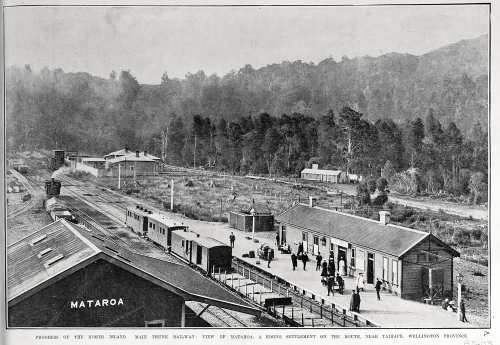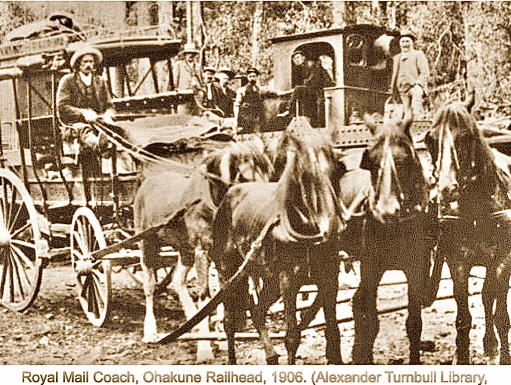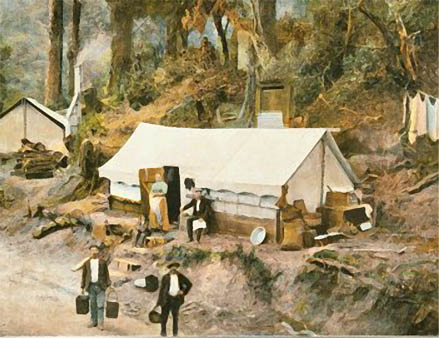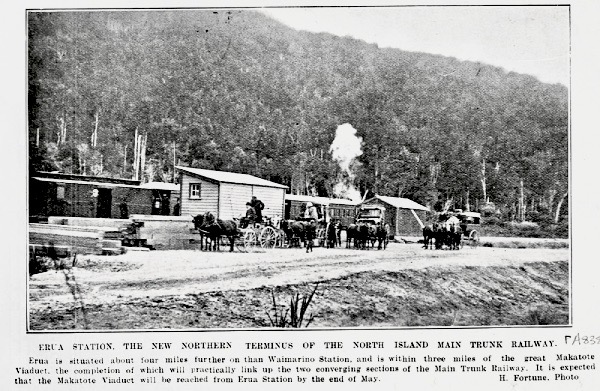By a Traveller
I found myself, a few weeks ago, debating where
and how I should spend a fortnight's vacation. "To Rotorua
and Auckland, via the Main Trunk, returning by the Wanganui
River," suggested itself as a profitable way in which to
spend a fortnight. That suggestion I adopted, and in due time
found myself travelling on the New Zealand railways.
A night was spent very pleasantly at Taihape, and a start made
next morning for Taumarunui. We changed into a Public Works
Department train, and then really began the Main Trunk journey.
Mataroa is on the boundary of the King Country, and of course
beyond that point liquor must not be taken. The officials at the
railway station are evidently very zealous in their efforts to
prevent liquor entering the King Country.

On the morning I am writing about, not only did they carefully
examine the luggage of all the passengers, but they stopped a
drunken man from continuing his journey. By the bye, I did not
see another man under the influence of liquor until Te Awamutu
(on the other boundary of the King Country) was reached.
Beyond Mataroa some pretty bush is passed, but on reaching the
Karioi plains there are simply miles and miles of bleak,
desolate tussock land. Deserted camps, where cooperative
labourers had flourished for a time and then moved on, mark the
progress of the construction of the line.
As the railhead is reached, the traveller, who may have become
somewhat wearied by the monotonous sameness of the journey,
wakes up to the fact that he has not travelled in vain, for
scene after scene of beauty comes into view. As the train
proceeds, the bush, in all its virgin beauty, gradually closes
in upon the railway track, until the train is practically
picking its way through huge trees and magnificent ferns,
pungas, and undergrowth.
At last steam is cut off and the train draws up at the
northernmost station on the line. What a sight it is! Nothing
like it can be seen in any other part of the Dominion. It is one
never to be forgotten, but alas, in a few months the opportunity
of witnessing it will have passed away.
In the middle of the line and just in front of the engine stands
a huge tree, which, immovable and impassive, seems to say with
an imperial air—" Thus far and no farther.'' The engine
bows its head but as it thinks of the hand that has harnessed
its fount of power it merely murmers. "Thus far and no
farther —just now.' Almost up to the right hand side of
the carriages are the toweling trees of the forest, while the
shrubbery and undergrowth are standing in their primeval glory.
In a small clearing outside the station is a scene of
excitement. Five coaches, each with its four-in-hand, are drawn
up waiting for the passengers who have come by tho train. Great
is tho hurrying and scurrying! Seats have been booked—an agent
has seen to that at Taihape—but each person is anxious to
I know ''Which is my coach? " Then there is an excited
confab as to whether box seats have been reserved, and so forth.

In the meantime luggage has been transferred from the guard's
van to the coach boot, and a hurried rush is made to a room on
the station platform, where a placard announces afternoon tea.
Though it is very little after midday, tea proves very
acceptable, and the travellers, refreshed and contented, clamber
into their respective conveyances. Pride of place is given to
the coach which carries His Majesty's mail and in a few minutes
five whips are cracking, twenty horses are straining at
their collars, and a twenty drive of the most unique nature is
begun.
What a new world is opened up! I shall not try to describe the
beauties which Nature has strewn lavishly before the eyes of the
traveller. But I must confess to a feeling of sadness as I gaze
upon the thousands and thousands of acres of glory penned up as
it were in the slaughtering yards. Soon will the butchers go
into those pens and an acre here and an acre there, the giants
will fall and their vestments disappear in smoke.
As the coach reaches the highest point of the road one looks
down upon a vast extent of forest, the appearance of which
resembles nothing so much as an ocean in the moonlight. The
ground is evidently hill and dale, and the tops of the trees
rise and fall as it were in billows. Clouds pass across tho sun,
and the shadows skim the tree tops in a weirdly fantastical way.
But it not the scenery—a kind that is almost indescribably
grand—which makes the drive memorable. It is the opportunity
given to see the last of the co-ops—a phase of life which is
rapidly drawing to a close.
After leaving the railhead the traveller comes upon an entirely
new world with a people peculiarly its own. He finds himself in
the midst of tent land, where the pioneers of civilisation are
roughing it in order that others may travel in comfort and maybe
live in plenty on the land which is now wild and untouched. As
the coach bowls along tho excellent road which winds its way
through the bush, glimpses of towns in embryo are obtained. What
are their destinies? Perhaps we would not smile at them if we
only knew.
Here is a township the name of which we do not hear. The main
street is the coach road. On it are several small huts, to go
into which would necessitate stooping by men less stalwart than
Sir Percy Blakeney. One is the leading hotel —temperance of
course, for is the town not in the King Country? It, or at any
rate, one like it, is the Harp of Erin, and the proprietor beams
upon the coach loads as they go hurrying by. "Hop beer sold
here" does not tempt the travellers, and consequently
mine host does not add to his day's takings.
By the way, hop beer must thrive wonderfully in this no-license
district! No matter where one looks, "Hop beer sold here"
is a sign shown prominently on tents and hut walls. Tho sign
writers on the Main Trunk perhaps would not satisfy an
up-to-date art master, but they certainly achieve what an artist
might not—their signs catch the eyes of the public, and that,
after all, is the chief end of such art. The cynic may be
inclined to smile as he passes these hop beer advertisements,
and think of words often used by the professional, conjuror—but
there, the beauty and quaintness of the surroundings banish
cynicism.
Alongside the hotel, which is also a store, is the township's
general provider, who has a wonderful assortment in his little
crib. Quaint indeed are these little pocket editions of business
houses. Then there is the residential portion. Here are the
tents where the workmen live. Each tent is supplied by the
Public Works Department, and bears the brand of the Broad Arrow.
Usually this brand is looked at askance, but on the Main Trunk
it is quite the thing. The tents are small, but some of the
inhabitants have endeavoured to secure a little comfort. Their
efforts have been in the direction of erecting tin chimneys, and
so making cooking operations more easy and pleasant than would
otherwise be the case.
No town, be it ever so small, is complete without a
boarding-bouse, and, as the coaches pass along the road, quite a
number of tents are seen bearing the sign "Boarders taken
in," with one establishment announcing board and lodging
at 17s 6d a week. "I wonder where they can put even one
boarder?" queries the traveller, but before an answer can
be given he is whirled halfway to the next township.

Practically tho whole of the population consists of men, but the
traveller now and again comes upon evidences those brave-hearted
women who have not flinched from following their husbands into
he wilds of the island. As the coach sweeps along, a glimpse is
caught of a clothes line laden with the week's wash, and through
an open door of the tent or whare is seen the white tablecloth
on which a meal is tastefully laid. Peeping through the door is
a toddler or a mother rocking her little one. Just a glimpse,
but it is a touch of Nature. Hew dreary in comparison look the
other tents!
So the coach speeds on. As Horopito is reached, rain falls in
torrents. The coach from the Waimarino end meets ours. Like us,
the passengers are hidden beneath umbrellas and wraps, and a
very merry party they seem, their laughter ringing in the air.
Horopito on a rainy day! The saints preserve us from tent
residence there!
Now we see the Main Trunk workers in a different light. All work
has been stopped, and the men have come into the "townships."
Some are standing in the lee of their tents, sheltering from the
rain, and others are congregated in their tents playing cards.
An hour passes by, during which time innumerable camps are
passed.
Then, as we leave the forest, the rain clears away, and almost
at the same moment we emerge on the Waimarino plains. We drive
on, and in the distance see our goal, the Waimarino station,
standing out prominently in the middle of a huge natural
amphitheatre. En route to it we pass gangs of platelayers busily
engaged laying the rails to the Erua Station, the next railhead,
which will be reached in the course of a few weeks.

At 4.40 pm our coaches swing alongside the Waimarino Station,
where a train is in waiting. So ends a drive which will always
remain a pleasant memory.
From Waimairino we dash downhill at a great speed through
magnificent bush scenery; In places the line is a triumph of
engineering skill. Especially is this the case in regard to the
Raurimu spiral, the wondrousness of which has become a household
word.
Leaving Raurimu, and still passing through glorious bush, the
train speeds on past Oio and Owhango, and a couple of miles
furtherl the Wanganud River is seen. Then follows a delightful
journey. Day is drawing to a close, and as Kakahi and Piriaka
are passed, the spirit of peace and repose seems to have
descended on the beautiful valley.
Night has now folded the land in its soft embrace, and as we
leave the train at Taumarunui, lamps have to be brought into
use. Dinner at Meredith House is is followed by a saunter
through the main street of the go-ahead town, and then slumber
ends an enjoyable day.
Source
Wanganui
Chronicle, 31st March, 1908.
Next
19.
The Rabbit Years